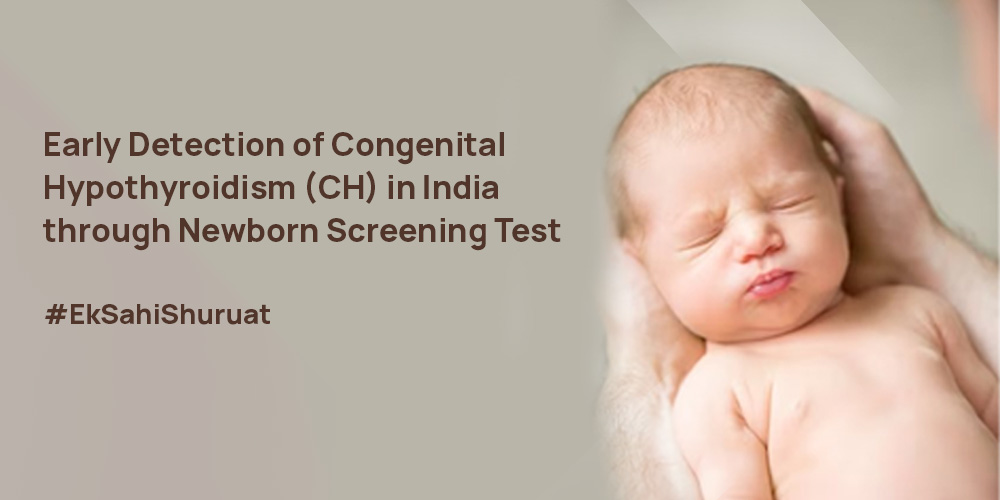Congenital Hypothyroidism (CH) is a significant health concern worldwide, affecting infants from birth. It is crucial to detect CH early to prevent irreversible consequences, such as growth and developmental delays. In India, where the prevalence of CH is relatively high, the implementation of newborn screening programs using screening kits has proven to be an effective strategy. This blog explores the importance of early detection, the significance of newborn screening kits, and the impact of CH screening in India based on the insights provided by various research studies.
Prevalence and Importance of CH Detection
Congenital Hypothyroidism is one of the most common endocrine disorders in newborns, affecting approximately 1 in 2,000 to 4,000 live births worldwide. In India, the prevalence is estimated to be around 1 in 2,800 to 3,500 births. Timely detection of CH is crucial because untreated cases can lead to severe cognitive impairment and growth retardation. Newborn screening programs utilizing screening kits play a vital role in identifying affected infants early, allowing for prompt treatment initiation and better long-term outcomes.
Implementation of Newborn Screening Programs in India
In India, the importance of early detection of CH led to the establishment of newborn screening programs. These programs involve the use of screening kits to detect thyroid hormone disorders in newborns. The kits facilitate the measurement of thyroid-stimulating hormone (TSH) levels, enabling the identification of infants with CH or transient hypothyroxinemia. The Indian Academy of Pediatrics (IAP) has recommended universal newborn screening for CH since 2010, emphasizing the need for early diagnosis and intervention.
Effectiveness of Newborn Screening Kits
Studies have demonstrated the effectiveness of newborn screening kits in detecting CH. A study published in Indian Pediatrics highlighted the success of newborn screening in identifying CH cases and preventing delayed treatment. The use of screening kits allows for early diagnosis, ensuring timely initiation of thyroid hormone replacement therapy and preventing irreversible damage.
Challenges and Solutions
Despite the benefits, several challenges exist in implementing newborn screening programs in India. These challenges include limited resources, lack of awareness, and logistical issues. However, research suggests that these challenges can be overcome through capacity building, training of healthcare professionals, and strengthening the healthcare infrastructure. Collaborative efforts between the government, healthcare professionals, and public health organizations are vital to addressing these challenges and expanding the reach of newborn screening programs.
Future Perspectives
As technology continues to advance, there is a need for continuous improvement in CH detection methods. Research is ongoing to explore the potential of molecular genetic techniques and point-of-care testing in newborn screening. Additionally, making this testing mandatory can enhance the efficiency of CH screening programs, particularly in remote areas of India. These advancements hold promise for further improving early detection rates and ensuring timely treatment for infants with CH.
Early detection of Congenital Hypothyroidism through newborn screening kits is crucial in India to prevent long-term complications. By implementing and expanding newborn screening programs, India can significantly improve the outcomes of affected infants, minimizing the impact of CH on their physical and cognitive development.
Trivitron Bringing Change with #EkSahiShuruat
#EkSahiShuruat, is an initiative aimed at promoting awareness about the significance of Newborn Screening by Trivitron Healthcare, a global Medtech Organization.
Trivitron believes that a good and healthy start is essential for every child, and NBS plays a vital role in achieving this goal. The primary objective of #EkSahiShuruat is to educate parents, healthcare professionals, and the general public about the importance of early detection and intervention in preventing or minimizing the impact of various disorders on a child’s health and development. Newborn Screening involves testing newborns for certain genetic, metabolic, and congenital disorders that may not be evident at birth but can have severe consequences if left untreated.
Through this initiative, Trivitron Healthcare aims to empower parents with knowledge and equip healthcare professionals with the tools and resources necessary for early diagnosis and intervention. By advocating for NBS, Trivitron strives to ensure that every child has a healthy start in life, free from the long-term effects of undetected disorders.

